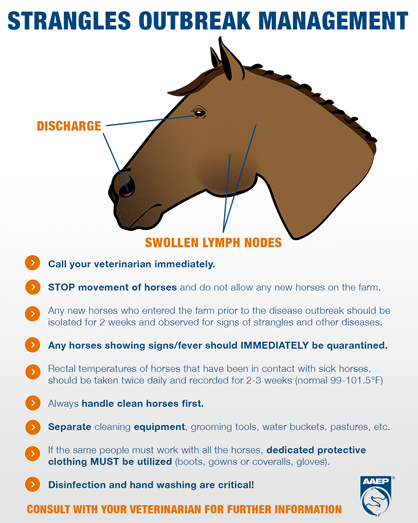Strangles Outbreak Management
American Association of Equine Practitioners
Strangles is one of the most commonly contagious diseases of the horse (worldwide) and in 2017 it became a nationally monitored disease. This condition is caused by bacterial infection with “Streptococcus equi subspecies equi” (referred to as “S. equi”), which typically infects the upper airway and lymph nodes of the head and neck, and is highly contagious in horse populations—particularly affecting young horses. Classic signs of the disease include sudden onset of fever as high as 106 degrees F, thick yellow nasal discharge, and swollen lymph nodes under the jaw.
Transfer from horse to horse usually involves direct face-to-face contact, or exposure to things such as contaminated feed, water, hands, veterinary instruments or grooming tools. A stall or van recently used to house or transport a horse that is shedding the organism may also be a source of infection.
WATCH OUT FOR ASYMPTOMATIC CARRIERS! (Sounds familiar, right?)
It is not uncommon for strangles infections to recur on a farm with previous outbreaks of the disease, and the primary source of recurrent infections are most likely asymptomatic carrier horses—animals who display no clinical signs but may continue to shed the bacteria for months to even years, serving as a continual source of new infections.
If you suspect a strangles outbreak, be sure to involve your veterinarian right away to determine the diagnosis and the best control practices for your particular farm. Without control and biosecurity measures, a strangles outbreak will ultimately affect all susceptible horses, last longer, and have a greater chance of leading to complications.
**Please note that strangles is a reportable disease in some states.**
To learn more about strangles, visit our website at https://aaep.org/issue/understanding-equine-strangles
And as always, contact your veterinarian for more information as they remain the best source of advice!











